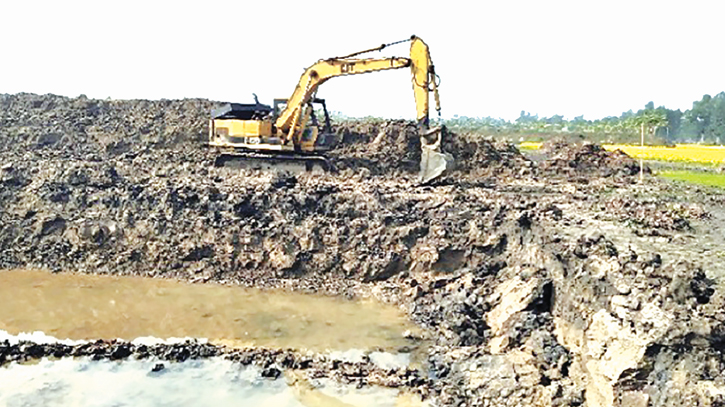
An excavator is seen digging a pond, destroying croplands in Sharifpur under Ashuganj upazila of Brahmanbaria. Photo: Messenger
The rampant digging of cropland in Ashuganj, Brahmanbaria, is not only decreasing land fertility but also posing a threat to food security as the amount of available cropland diminishes.
The excavation of soil for various purposes, including brick kilns, is turning the once fertile land into pits, disrupting irrigation and exacerbating the challenges faced by the agricultural community.
The situation has escalated to the point where the landscape resembles a "pond-cutting festival," with excavators rapidly transforming cropland into ponds for undisclosed purposes.
Shockingly, landowners engaging in this activity face little hindrance from the administration, despite the clear violation of government laws prohibiting the alteration of agricultural land.
Some landowners, particularly those transforming their land into ponds, revealed that a resident of Sharifpur Union, described as a journalist with political connections, initiated the pond-cutting activities. However, when questioned, Ashuganj AC (land) Kazi Tahmina Sarmin claimed ignorance of the matter and assured swift action against any wrongdoing.
On January 14, three ponds were discovered at the entrance of Sharifpur village, illustrating the extent of the issue. These ponds, owned by Awal Mia, Abdus Samad, and Mohiuddin Mohan, were created by excavating large areas of cropland within a mere two days. Shahin Bakshi, from the neighboring Bayek village, played a role in these activities, using an excavator to quickly cut the soil and contribute to the reduction of cropland in the region.
The landowners involved, however, display arrogance and confidence in their actions. Awal Mia claimed to have obtained documents from the administration permitting the pond-cutting, although he failed to produce any evidence to support his statement. Similarly, Abdus Samad and his associates asserted that they managed the administration through a local journalist, ensuring a smooth pond-cutting process without legal consequences.
In the past decade, the construction of numerous ponds in the area has led to a significant reduction in cropland. Astonishingly, despite this alarming trend, the administration has failed to take substantial action against those violating the Agricultural Land Protection Act - 2016 (Draft).
The relevant legal framework, specifically Section 4(1) of the Agricultural Land Protection Act, explicitly prohibits any alteration in the use class of agricultural land. Additionally, Section 7(1) outlines the penalties for violating this act, including rigorous imprisonment for up to three years, a minimum fine of Tk 3 lakh, or both. Confiscation of the agricultural land by the government is also stipulated as part of the consequences for non-compliance.
Despite the clear legal provisions, the ongoing pond cutting activities in Ashuganj highlight a lack of enforcement, with perpetrators seemingly operating with impunity. The unchecked conversion of cropland into ponds not only jeopardizes land fertility and food security but also undermines the government's efforts to protect agricultural land.
The authorities must take immediate and stringent action against those responsible for pond-cutting activities, ensuring the protection of agricultural land, preservation of fertility, and ultimately safeguarding food security in the region.
Messenger/Disha








